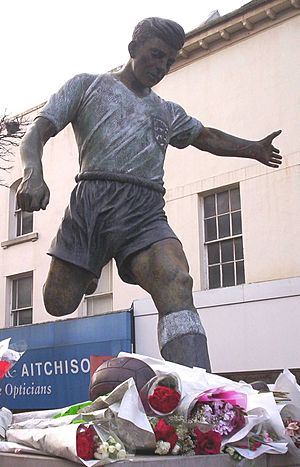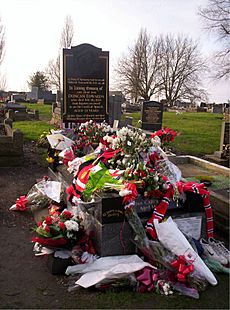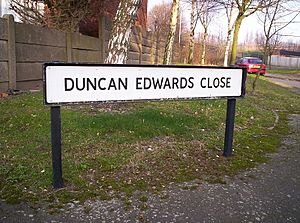Duncan Edwards facts for kids

The statue of Edwards in the centre of his home town of Dudley
|
|||
| Personal information | |||
|---|---|---|---|
| Full name | Duncan Edwards | ||
| Date of birth | 1 October 1936 | ||
| Place of birth | Woodside, Dudley, England | ||
| Date of death | 21 February 1958 (aged 21) | ||
| Place of death | Munich, West Germany | ||
| Height | 5 ft 11 in (1.80 m) | ||
| Position(s) | Left half | ||
| Youth career | |||
| 1952–1953 | Manchester United | ||
| Senior career* | |||
| Years | Team | Apps | (Gls) |
| 1953–1958 | Manchester United | 151 | (20) |
| International career | |||
| 1949–1952 | England Schoolboys | 9 | (0) |
| 1954–1957 | England U23 | 6 | (5) |
| 1953–1954 | England B | 4 | (0) |
| 1955–1957 | England | 18 | (5) |
| *Club domestic league appearances and goals | |||
Duncan Edwards (born October 1, 1936 – died February 21, 1958) was an English footballer. He played for Manchester United and the England national team. He was part of the famous "Busby Babes" team. This was a young Manchester United team led by manager Matt Busby in the mid-1950s. Duncan played 177 games for the club. He was known for being very strong, tough, and a natural leader on the field. Many people say he was one of the best players ever.
Duncan Edwards was one of eight players who died because of the Munich air disaster. He survived the plane crash at first. But he passed away in the hospital two weeks later. Many players who played with him said he was one of the best, if not the best, player they ever saw.
Born in Woodside, Dudley, Duncan Edwards joined Manchester United as a teenager. He became the youngest player to play in England's top football league. He was also the youngest England player since World War II. He played 18 times for his country. In his short career of less than five years, he helped United win two league titles. They also won two FA Charity Shields. His team reached the semi-finals of the European Cup.
Contents
Early Life and Football Dreams
Duncan Edwards was born on October 1, 1936, in Woodside, Dudley. He was the only child of Gladstone and Sarah Ann Edwards to live to adulthood. His younger sister, Carol Anne, died when she was just 14 weeks old. His cousin, Dennis Stevens, also became a professional footballer.
When Duncan was young, his family moved to 31 Elm Road in Dudley. He went to Priory Infant and Junior Schools from 1941 to 1948. Then he went to Wolverhampton Street Secondary School. He played football for his school and local teams. He also did morris dancing! He was chosen for a national dancing festival. But he also had a tryout for the English Schools Football Association's under-14 team on the same day. He chose football.
Duncan impressed the football coaches. He was picked to play for the English Schools team. His first game was at Wembley Stadium on April 1, 1950. He was soon made captain of the team. He stayed captain for two seasons. Big clubs noticed him early. A scout for Manchester United saw him in 1948. He told manager Matt Busby that Duncan was a 12-year-old schoolboy who needed "special watching."
Joe Mercer, who coached the England schools team, told Busby to sign Duncan. Other clubs like Wolverhampton Wanderers and Aston Villa also wanted him. Duncan signed for United as an amateur on June 2, 1952. There are different stories about when he signed his first professional contract. Some say it was on his 17th birthday in October 1953. Others say it was a year earlier. Some stories say a club official came to his home just after midnight to get his signature quickly. The manager of Wolves, Stan Cullis, was upset. He said United might have offered money to Duncan or his family. But Duncan always said he wanted to play for the Lancashire team. To be safe, he also started learning to be a carpenter.
Duncan's Football Career
Duncan Edwards started his Manchester United journey in the youth team. He played in the team that won the first ever FA Youth Cup in 1953. But he had already played for the first team by then. On April 4, 1953, he played in a league match against Cardiff City. United lost 4–1. Duncan was only 16 years and 185 days old. This made him the youngest player ever in England's top football league. Manager Matt Busby wanted to bring in young players. Duncan, along with players like Dennis Viollet and Jackie Blanchflower, joined the team. This new group of players became known as the "Busby Babes." After his first game, a newspaper said he showed "promise of fine ability." But they also said he needed to "move faster."
In the 1953–54 season, Duncan played more often for the first team. He played in 24 league matches. He also played in the FA Cup. But he was still part of the youth team. He helped them win the Youth Cup for the second year in a row. He also played for the national under-23 team. People thought he might play for the main England team. But a poor game against Arsenal meant he wasn't picked yet.
The next season, he became United's regular left-half. He played 36 games and scored his first goals. He ended the season with six goals. People again called for him to play for the senior England team. He was picked for an exhibition match against a Scottish team. In March, he played for England B. A week later, he was called up for the full national team. He played his first game for England against Scotland on April 2, 1955. He was 18 years and 183 days old. This made him England's youngest player since World War II. This record lasted for 43 years until Michael Owen played in 1998. Three weeks later, United let him play in the FA Youth Cup final again. This was criticized because he was already an England international. But Matt Busby defended the choice. Duncan helped United win their third Youth Cup.
In May 1955, Duncan went with the England team to Europe. They played against France, Portugal, and Spain. He started all three games. After the tour, he joined the British Army for two years. This was compulsory for young men back then. He was stationed near Shrewsbury with teammate Bobby Charlton. He was allowed to leave to play for United. He also played in army matches. In one season, he played almost 100 games in total!
In the 1955–56 season, Duncan played 33 times. United won the league by 11 points. The next season, he played 34 league games. United won their second league title in a row. He also played in the 1957 FA Cup Final. United lost 2–1 to Aston Villa. This meant they missed out on winning both the league and the FA Cup. He also played in United's first ever European Cup games. This included a 10–0 win over Anderlecht. This is still the club's biggest win ever. United reached the semi-finals of this competition. They were knocked out by Real Madrid.
By now, he was a regular player for England. He played in all four of England's qualifying games for the 1958 World Cup. He scored two goals in a 5–2 win over Denmark. People thought he would be a key player for England in the 1958 World Cup. Many believed he would become the national team captain.
Duncan started the 1957–58 season very well. There were rumors that big Italian clubs wanted to sign him. United was fighting for a third league title. They also started strong in the FA Cup and European Cup. His last game in England was on February 1, 1958. He scored the first goal to help United beat Arsenal 5–4. Five days later, he played his last ever match. United drew 3–3 away to Red Star Belgrade. This meant they went through to the semi-finals of the European Cup.
Tragic Death
On February 6, 1958, Duncan and his teammates were flying home from Belgrade. Their plane crashed after stopping to refuel in Munich, Germany. Seven players and 14 other people died right away. Duncan was taken to the hospital. He had many serious injuries, including broken legs and ribs. Doctors thought he could get better. But they doubted he would ever play football again.
Duncan woke up soon after reaching the hospital. For the next two weeks, his condition changed. Doctors used a special machine to help his kidneys. But this machine caused him to bleed inside. Despite this, the day after the crash, he asked assistant manager Jimmy Murphy, "What time is the kick off against Wolves, Jimmy? I mustn't miss that match." By February 14, his condition was said to have "dramatically improved." But by February 19, he got worse again. Doctors said they were "amazed" at how hard he fought to live. But he passed away at 2:15 a.m. on February 21, 1958. Just hours before he died, a football magazine with his smiling picture on the cover was published.
Duncan was buried at Dudley Cemetery five days later. His sister Carol Anne was buried next to him. More than 5,000 people lined the streets of Dudley for his funeral. His tombstone says: "A day of memory, Sad to recall, Without farewell, He left us all." Fans still visit his grave regularly.
Duncan's Legacy
Duncan Edwards is remembered in many ways in his hometown of Dudley. A special stained-glass window showing Duncan was put in St Francis's Church in 1961. It was paid for by donations from football clubs. His former manager, Matt Busby, unveiled it. A statue of Duncan was also unveiled in the town center in October 1999. His mother and former teammate Bobby Charlton were there.
In 1993, a street of homes near his cemetery was named "Duncan Edwards Close." A pub near where he grew up was renamed "The Duncan Edwards" in 2001. But it closed and was later destroyed. In 2006, a £100,000 sports area was opened in Priory Park, where Duncan played as a boy. Sir Bobby Charlton unveiled it. In 2008, a road in Dudley was renamed 'Duncan Edwards Way'.
Until 2016, the Dudley Museum and Art Gallery had an exhibition about his career. It included his England caps. This collection is now owned by Manchester United. In 2011, a special Blue Plaque was put up where Duncan and other United players used to live. In 2022, a new leisure center in Dudley was named the Duncan Edwards Leisure Centre.
In 1996, Duncan Edwards was one of five players chosen to be on British stamps. These stamps celebrated the UEFA Euro 1996 football tournament. An actor named Sam Claflin played him in the 2011 TV film United. This film was about the Munich disaster.
Other famous footballers have praised Duncan's skills. Bobby Charlton said Duncan was "the only player that made me feel inferior." He called Duncan's death "the biggest single tragedy ever to happen to Manchester United and English football." Terry Venables believed that if Duncan had lived, he would have been the one to lift the World Cup trophy for England in 1966. Tommy Docherty said, "Duncan would have become the greatest player ever." He thought Duncan was better than George Best, Pelé, and Maradona. In 2002, Duncan was put into the English Football Hall of Fame.
How Duncan Played Football
Duncan Edwards is mostly remembered as a defensive midfielder. But he could play in almost any position on the field. He was so good that he once started a game as a striker. Then he switched to central defence during the same game! His best qualities were his physical strength and how much authority he had on the field. This was amazing for such a young player. He was also known for his great stamina.
Stanley Matthews said Duncan was "like a rock in a raging sea." Bobby Moore said he was like the Rock of Gibraltar when defending. But he also said Duncan was "dynamic coming forward." His strong build earned him nicknames like "Big Dunc" and "The Tank." He is considered one of the toughest players of all time.
Duncan was known for his powerful and well-timed tackles. He could pass and shoot equally well with both feet. He was famous for his strong runs up the field. He was also good at heading the ball. And he could hit very powerful long-range shots. After scoring a goal in 1956 against West Germany, the local newspapers called him "Boom Boom." This was because of the "Big Bertha shot in his boots."
Life Outside Football
Outside of football, Duncan Edwards was a private person. He enjoyed fishing, playing cards, and going to the cinema. He went to dances with his teammates. But he was not very confident in social settings. Jimmy Murphy described him as an "unspoilt boy." He kept his strong Black Country accent. His teammates would sometimes copy it. Once, the police stopped him for riding his bicycle without lights. He was fined five shillings by the police and two weeks' wages by his club.
When he died, Duncan was living in Stretford. He was engaged to be married to Molly Leech. She was 22 years old and worked for a company in Altrincham. They met at a hotel near Manchester Airport. They dated for a year before getting engaged.
Duncan appeared in advertisements for Dextrosol glucose tablets. He also wrote a book called Tackle Soccer This Way. These extra activities helped his income. He earned £15 per week during the season and £12 per week in the summer. His book was published shortly after he died. It was out of print for many years but was re-published in November 2009.
 In Spanish: Duncan Edwards para niños
In Spanish: Duncan Edwards para niños
 | Percy Lavon Julian |
 | Katherine Johnson |
 | George Washington Carver |
 | Annie Easley |




